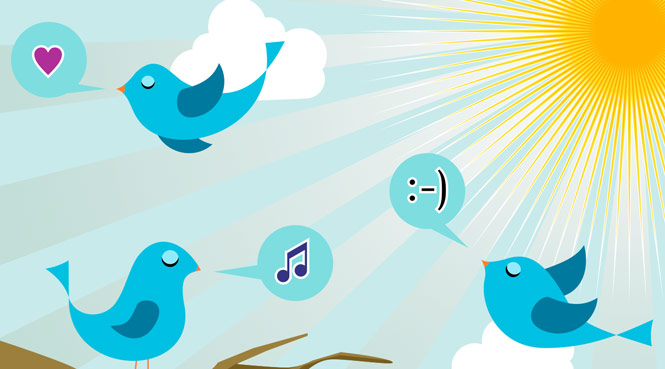
Buddy Media, the social media engagement company, recently completed a study of 320 top brands on Twitter — Fortune 1000 companies like Coke, American Eagle, Microsoft, and Nike — looking at what works and what doesn’t to get maximum engagement, and the greatest degree of virality.
[aditude-amp id="flyingcarpet" targeting='{"env":"staging","page_type":"article","post_id":482663,"post_type":"story","post_chan":"none","tags":null,"ai":false,"category":"none","all_categories":"business,entrepreneur,marketing,media,social,","session":"A"}']VentureBeat spoke to Joe Ciarallo, vice president of communications for Buddy Media, to get all the details.
Tweet during the day
One of the surprising findings is that the best times to engage on Twitter is almost opposite the best times to engage on Facebook.
AI Weekly
The must-read newsletter for AI and Big Data industry written by Khari Johnson, Kyle Wiggers, and Seth Colaner.
Included with VentureBeat Insider and VentureBeat VIP memberships.
“That’s one of the interesting things we found,” Ciarallo said. “On Facebook, you see better engagement in ‘non-busy’ hours … after work time. On Twitter, you see better engagement in ‘busy’ hours.”
When I asked Ciarallo why that might be, he speculated that for some, Facebook is more of a leisure activity, while Twitter is something that people keep an eye on for work: tracking their Twitter news feeds for breaking news or relevant information.
“But the optimum time differs by industry,” Ciarallo cautioned. “For example, fashion brands are not tweeting on Saturday and Sunday as much as other brands, but they’re getting better engagement.”
Keep it short and tweet
And while some might think that 140 characters is already pretty short, another thing that Buddy Media found is that even shorter tweets were the most successful.
“Tweets that contain less than 100 characters have 17 percent higher engagement,” said Ciarallo. “What they’re doing is leaving room for others to add their own thoughts and comments in a retweet.”
[aditude-amp id="medium1" targeting='{"env":"staging","page_type":"article","post_id":482663,"post_type":"story","post_chan":"none","tags":null,"ai":false,"category":"none","all_categories":"business,entrepreneur,marketing,media,social,","session":"A"}']
Include a link, but …
Twitter marketers should definitely include a link in their tweet. “We saw 86 percent higher engagement for tweets with links,” Ciarallo told VentureBeat. This is another difference vis-a-vis Facebook, where links can be counterproductive.
But beware: even though these were Fortune 1000 companies, there were a lot of link errors.
“The biggest thing for links — I know it’s kind of obvious — make sure the link works!” said Ciarallo. Most of the faulty links were simply mistakes, like not leaving a space between the text of your tweet and the link itself, causing the link to fail.
[aditude-amp id="medium2" targeting='{"env":"staging","page_type":"article","post_id":482663,"post_type":"story","post_chan":"none","tags":null,"ai":false,"category":"none","all_categories":"business,entrepreneur,marketing,media,social,","session":"A"}']
Don’t tweet tweet tweet
“Communities are all different,” Ciarallo said, “and this is aggregate data … but there’s definitely a sweet spot between one and four tweets a day. When you get over 20, you start to see negative engagement.”
In other words, over-tweeting will hurt your brand: followers may unfollow, or followers may just tune out and stop replying, retweeting, and interacting with your brand on Twitter.
[aditude-amp id="medium3" targeting='{"env":"staging","page_type":"article","post_id":482663,"post_type":"story","post_chan":"none","tags":null,"ai":false,"category":"none","all_categories":"business,entrepreneur,marketing,media,social,","session":"A"}']
Use images
In a somewhat surprising result, images in tweets are a huge positive to engagement. And, it must be said, here’s an example where Twitter does NOT deviate from Facebook marketing: images are also strong engagement factors in Facebook as well.
It’s surprising in Twitter because images are not seen by default in the Twitter stream: they typically require an extra click. And it can be even harder to see images in third-party Twitter apps, or the Twitter mobile apps.
“When you see those specific links, you know it’s an image and people want to see them,” Ciarallo said.
[aditude-amp id="medium4" targeting='{"env":"staging","page_type":"article","post_id":482663,"post_type":"story","post_chan":"none","tags":null,"ai":false,"category":"none","all_categories":"business,entrepreneur,marketing,media,social,","session":"A"}']
Ask for retweets
And finally: asking for the retweet. “You should ask people to share your content if you want engagement,” says Ciarallo.
I’ve always personally been a little shy to use “PLS RT” or “retweet” in a tweet, thinking it somewhat obnoxious. But, says Ciarallo, it’s about spelling it out for people. If you do it too often, he agrees, people will get sick of it.
But occasionally asking for the retweet is good social media marketing. Just be sure you spell out the full “please retweet,” Ciarallo emphasizes. That gets much more action than RT or PLS RT.
[aditude-amp id="medium5" targeting='{"env":"staging","page_type":"article","post_id":482663,"post_type":"story","post_chan":"none","tags":null,"ai":false,"category":"none","all_categories":"business,entrepreneur,marketing,media,social,","session":"A"}']
Other tips from Buddy Media include: tweet on weekends, not just weekdays, as followers are still engaged then. And, use hashtags, but sparingly, to mark the topic of your content.
Interested? You can get the full report right here.
Image credit: ShutterStock
VentureBeat's mission is to be a digital town square for technical decision-makers to gain knowledge about transformative enterprise technology and transact. Learn More